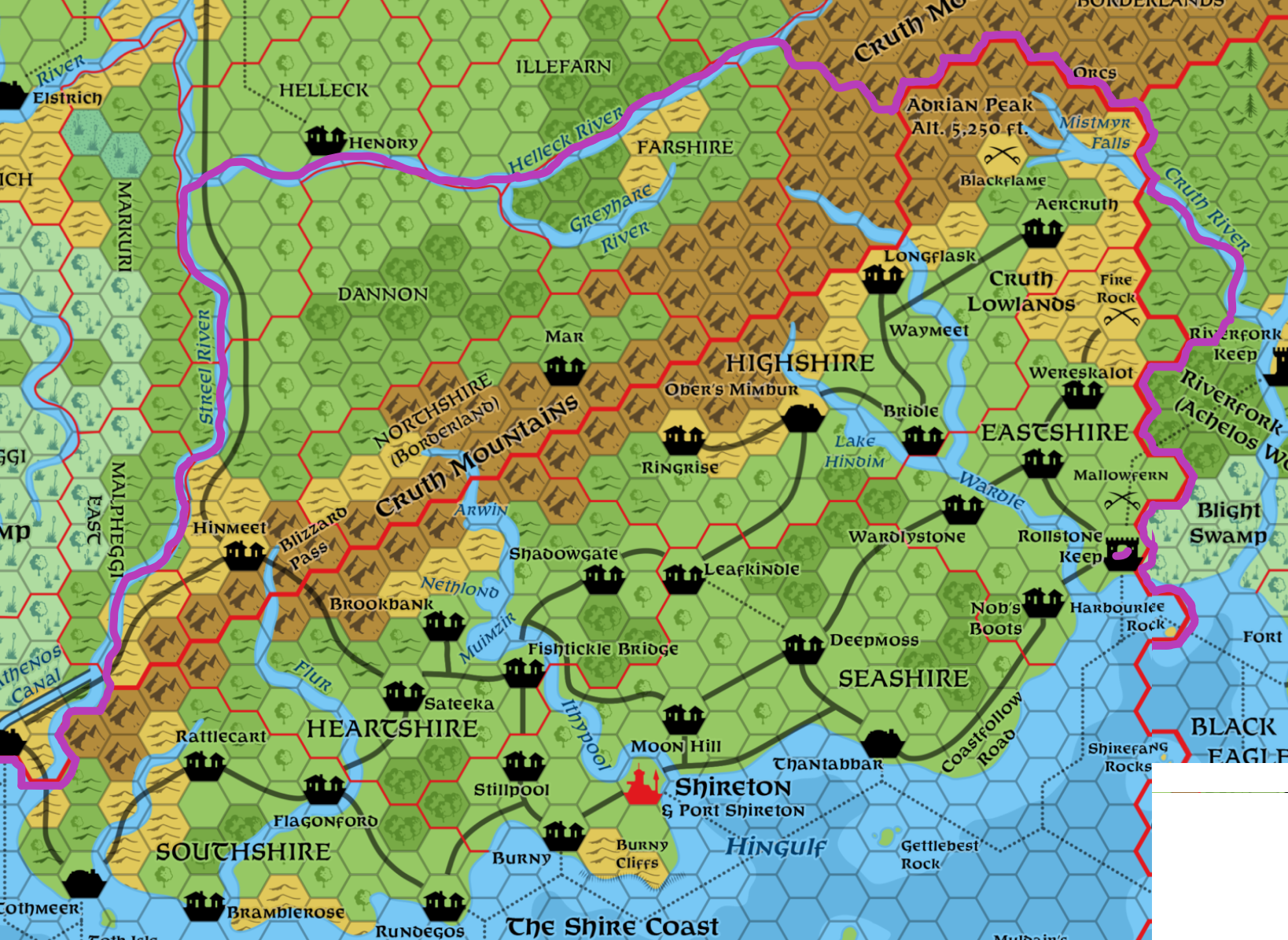
Thoughts on the breakup of Darokin and formation of Greatshire
by Geoff GanderAs per my timeline referenced by Agathokles, the old kingdom fragmented into petty dominions - many often squabbling over resources and territory - and the situation only really ended with the Great Merger in AC 927. Up until that event there was a *slow* consolidation as regional powers (like the Duchy of Darokin) began to absorb their weaker neighbours, but decades of infighting had pretty much exhausted all the royal armies and was ruining the economy (hence the merchant houses stepped in and quietly took control, aided by blackmail and an assassination or two).
So, at least in my view, there are quite a few old noble families kicking around in Darokin. Some have retained their lands and titles (at least on paper) as border magistrates (if it ain't broke, don't fix it), others have gone on with life and got into business in their own right (some quite good at it), while still others yearn for the "good old days" and gather with like-minded fallen nobles (and their followers) and plot to overthrow the merchant houses and restore what they think is the natural order of things. Many of the latter group are sad reactionaries who never let go of the past, but a handful (at least in my campaign) are politically connected and could be dangerous opponents.
Giampaolo Agosta wrote:
I would assume that hostile governments (and possibly some ostensibly friendly ones) would prop up these groups to harass the Darokin government. Thyatis and Hule, for instance, but possibly also Ethengar and/or Glantri.
Absolutely - and sometimes such alliances would be cultivated as a means of self-preservation.
For example, if Darokin were to collapse I would think Glantri would be very interested in propping up a Free City or Duchy of Corunglain as a buffer on its southern frontier, and likewise Alfheim would want communities on its border to remain stable (or at least not become staging grounds for invasion). In neither of those cases would conquest be on the table, but the Glantrians and elves would reach out to such groups to see (indirectly) if they would be reliable partners - and they may have already done so. Nothing personal or no ill-will intended per se, but hard reality would dictate those sorts of decisions, and even close allies spy on each other. I could even see the Five Shires quietly establishing the borderland of Farshire as a client state - again, to keep the passes relatively secure as well as cultivate a possible reliable ally in the region. Hin adventures would probably move in there to make a name for themselves and relive the old stories of Hindon and Shaerdon - which would make for an interesting campaign.
Thoughts of a "Greatshire" or "Greater Hindon" led me to cobble this together from Thorf's maps. Logically, the hin would want to establish a secure border, and rivers form natural defences. I couldn't imagine them securing the Blight Swamp, and depending on the situation Karameikos might not do much if the hin quietly advanced along the Upper Cruth River.
They would definitely want to ensure the lands south of the Helleck River were at least friendly. Northshire, Farshire, and Hinmeet might be annexed (the latter added to an expanded Northshire), while the region of Dannon might be a buffer zone under the control of hin militia. They would probably build a small fort or keep where the Helleck and Streel meet, if only to keep watch over things. Eventually the region might be settled, and this is where hin adventures could carve their own dominions.

Greebrier wrote:
What do you think Selenica would do, try to become independent or settle for being Ylaruam's gateway to the west?
Based only on what I've written over the years about Darokinian history, Selenica was at various times an independent city-state ("Salonikos" in ancient times) or petty kingdom, as well as being a pre- al-Kalim era Ylari realm (the Caliphate of al-Zalenikah) in the AC 400s, before being conquered by the Duchy of Darokin. There are definite cultural ties with the Ylari.
I would think they have the population base and resources to try to strike out on their own as a realm unto themselves. They would probably assert control over Fort Hobart, Reedle, and possibly Nemiston, and would offer protection to hamlets and other settlements in the area too small to appear on an 8-mile hex map. Depending on Ylaruam's stance, they might entertain trade with Selenica; however, I doubt they would be willing to extend that to military control - Selenica is too far away, and it would be easy for Thyatis to move north and cut it off (and taking control would probably be seen as a provocation).
but as far as Darokin.. and the future of the Duchy.. or Kingdom of Corunglain once Darokin falls apart..the Glantrians are are Darokin's best ally.. saved their bacon in the Hulean invasion by sending a large force of some of Glantri's best troops to beat back the Master... but Glantri wants a strong secure ally with Darokin. No funny games or destabilizing.. makes zero plausible sense. Why destabilize a friend.. right on a safe and secure southern flank.